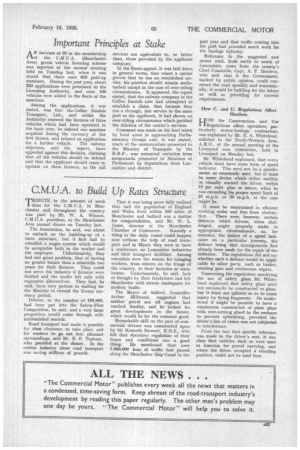C.M.U.A. to Build I.Jp Rates Structure
Page 37

If you've noticed an error in this article please click here to report it so we can fix it.
'TRIBUTE to the amount of work I done for the C.M.U.A. in Manchester and throughout the country was paid by Mr. W. A. Winson, C.M.U.A. president, at the Manchester Area annual dinner on Tuesday last. The Association, be said, was about to embark on the building-up of a rates structure, but it first had to establish a wages system which would be acceptable both to the worker and the employer. Unfortunately, they had one great problem, that of having no greater tenure than a miserable two years for their licences. They could not serve the industry if licences were limited and the trader left only with expensive alternatives. They had, he said, been very patient in waiting for the Minister to extend the licence currency period.
Drivers, to the number of 100,000, had been put into the Safety-First Competition, he said, and a very large proportion would come through with unblemished records.
Road transport had made it possible foi slum clearance to take place and for workers to go out into pleasant surroundings, said Mr. E. F. Topham, who presided at the dinner. In the cotton industry alone road transport was saving millions of pounds. That it was being more fully realized that half the population of England and Wales lived within 100 miles of Manchester and Salford was a matter for congratulation, said Mr. W. L. Jones, director of the Manchester Chamber of Commerce. Scarcely a thing in the daily round could happen now without the help of road transport and in March they were to have a conference on Lancashire industries and their transport facilities. Among essentials were the means for bringing workers, from estates on the fringe of the country, to their factories or warehouses. Unfortunately, he said, lack of thought by their forefathers had left Manchester with streets inadequate for modern traffic.
The Mayor of Salford, Councillor Arthur Millwood, suggested that neither petrol nor oil engines had reached finality, and he looked for great developments in the future, which would be for the common good.
Remarkable skill on the part of commercial drivers was commented upon by Sir Kenneth Stewart. K.B.E., who felt that Statutory regulation of their hours and conditions was a good thing. He mentioned that over 7,000,000 tons of traffic had passed along the Manchester Ship Canal in the past year and that traffic coming into the port had provided much work for the haulage industry.
Reference to the suggested new motor road, from north to south of Lancashire, came from the county's Chief Constable, Capt. A. F. Hordern, who said that if the Government, backed by public opinion, could construct the road speedily and economically, it would be building for the future as well as providing for current requirements.




















































































